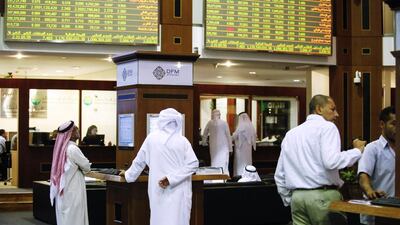Bigger trading volumes on the country’s bourses concentrated among a handful of brokerages have sparked questions on whether some firms are providing excessive leverage, with quotas above the one-to-one ratio legally allowed.
That level was set by the Emirates Securities and Commodities Authority (SCA), the market regulator.
“Nowadays, any stock brokerage that doesn’t offer margin services to their clients doesn’t make money,” says Khaldoun Jaradat, a trader at Brokerage House Securities in Dubai.
“Companies who aren’t accredited by the regulator are even publishing advertisements in the Arabic newspapers and clients are shopping for best deals.
“My fear is that is if the markets witness a correction we will come back to the tragedies of 2009, when court cases emerged between brokerages and their clients and the amount of leverage owed to banks caused those companies to shut down.”
Stockbrokerage firms are moving on from a phase of restructuring and consolidation since the wake of the 2008 global financial crisis. There are 47 active brokerage companies that trade on the local bourses from more than 100 in 2010.
Plummeting shares listed on the local stock markets in 2009 produced a spate of legal clashes between brokers and their clients over trades made at the peak of the market. Brokerages were required to settle all commercial disputes before they can be dissolved, and the number of firms looking to wind up increased – triggering arguments between trading houses and disaffected clients.
Some brokers who had verbal agreements to trade on their clients’ behalf before the 2008 plunge tried to avoid responsibility on the loss of clients’ wealth. On the other side, some investors who leveraged their positions through so-called margin trading tried to avoid paying for soured investments, alleging brokers had no written agreements to trade on their behalf.
The story here was not dissimilar to what was happening in the United States and elsewhere. As the former US Federal Reserve vice chairman Alan Blinder said in a New York Times editorial in 2009: “Before then, leverage of 12 to 1 was typical; afterward, it shot up to more like 33 to 1. What were the SEC [the US securities and exchange commission] firms thinking?”
Investors and the equity markets were hit by a double whammy in 2011 when the Arab Spring uprisings and the European debt crisis caused a fall in stock prices, triggering margin calls and exacerbating the problem of leveraged investing.
Now, the fear is of a similar crisis amid a market rally since January, with the Abu Dhabi Securities Exchange General Index suring about 50 per cent and the Dubai Financial Market General Index (DFM) up by almost 85 per cent.
“I think today, margin has become an important aspect of our market and contributes to a lot of the current trading value,” says Mohammed Ali Yasin, the managing director at National Bank of Abu Dhabi’s brokerage arm. “The problem is that not all brokerages companies are adhering to the implementation of margin law, which could be leaving many investors at risk if markets turn the other direction and also puts companies that adhere to the regulation at a disadvantage to the others.”
The regulator did not respond to queries sent by The National.
The SCA approved margin trading last year and accredited six companies to offer margin services.
Inevitably, the bigger brokerages have been in the spotlight over market concerns. Any such attention, however, does not trouble the largest, the Abu Dhabi-based Mena Corp, ranked first by market share in October on the DFM
“People can accuse us about whatever they want,” says Fathi ben Grira, the chief executive of Mena Corp, which traded Dh3.56 billion on the DFM in October. “Our strategy is that we never rely on one or two clients. I have 35 brokers. Each one of them brings clients. What we see today is a lot of cash coming back to the country, especially from Saudi Arabia,” Mr Grira adds. “It’s not really huge leverage. We adopt a one-to-one leverage ratio. If our clients are happy with that quota it means they can’t get more elswhere.”
Al Ramz Securities, the second-biggest and which traded Dh2.35bn on the DFM in October, is equally unruffled saying it offers clients less than the one-to-one ratio.
“We follow the rules and more conservative – offering 50 to 80 per cent leverage – depending on the client, his track record and credibility,” says Murtada Mohammed Al Dandashi, the managing director at Al Ramz Securities in Abu Dhabi.
“We don’t want to create anything that’s not healthy for the market. It’s not a joke.”
halsayegh@thenational.ae

